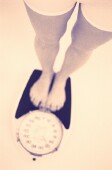
WEDNESDAY, Sept. 1 (HealthDay News) — A new study is linking the popular weight loss drug Meridia to an increased risk of non-fatal heart attacks and stroke, although taking the drug did not seem to up the risk of death in patients with a history of heart problems.
The finding is stirring mixed reactions from experts.
According to the authors of the trial, which was funded by Meridia’s maker, Abbott, the findings are generally in line with what has been known about the drug and shouldn’t change how it is used.
“The only time you’ve got an increase in heart attacks or strokes were in those patients who had had previous heart disease or strokes, in other words, the people who . . . should never have received the drug in the first place,” said Dr. Philip T. James, a professor at the London School of Hygiene and Tropical Medicine in England, and first author on the paper, which appears in the Sept. 2 issue of the New England Journal of Medicine.
Since January, Meridia (sibutramine), has carried a label warning that it should not be used by people with preexisting heart disease, so “the current prescription is entirely appropriate,” James said.
However, not everyone agrees. The U.S. Food and Drug Administration is slated to meet in September to decide if more regulatory action — perhaps a tougher “black-box” warning or even removing Meridia from the market — should be taken.
According to Dr. Greg Curfman, executive editor of the NEJM and co-author of an accompanying editorial, the FDA’s January warning was based on preliminary information only. The new study results represent the first hard data, “the first outcomes trial,” he said.
Based on the findings, he and others wonder if the drug is worth keeping around.
The drug did not seem to make people healthier, Curfman said. “Some people were actually made worse,” he said. “All this taken together results in an unfavorable risk-benefit profile and, based on that, we don’t see a rationale for keeping this on the market.”
Also, he said, “the efficacy of producing weight loss with the drug is very unimpressive. In this trial, patients lost on average less than 4 kilograms [about 9 pounds] and we know that that’s not going to translate into a real health benefit over time. It’s not enough weight loss. The FDA has a benchmark of about 5 percent loss of baseline body weight to consider a weight loss drug [effective].”
A University of Rochester expert concurs.
“I have never really found that people taking Meridia had obtained a real substantive weight loss,” said Dr. J. Chad Teeters, assistant professor of clinical medicine, cardiology division at the University of Rochester Medical Center. “It seems that a lot of these ‘quick fix’ weight loss drugs don’t really live up to the hype and they come with risks. I think there’s probably going to be a significant downturn in the use of the drug given the low efficacy and increased risk of side effects.”
This trial involved almost 11,000 older overweight or obese adults with type 2 diabetes or heart disease or both who were randomized either to take Meridia or a placebo and followed for about 3.4 years.
In the group taking Meridia, 11.4 percent had a heart attack, stroke or died as the result of a heart problem, versus 10 percent in the control group, a 16 percent increase.
People taking Meridia also had a 28 percent higher risk for nonfatal heart attack and a 36 percent raised risk for nonfatal stroke, compared to those taking placebo, the authors found.
All trial participants were also engaged in a diet-and-exercise program to lose weight, whether they were taking the drug or not, said study author James. “Meridia is not a wonder drug that guarantees people lose weight but it is a major additional help for people who change their diet and increase their physical activity,” he said.
But Teeters narrowed the prescription. “Good old-fashioned diet and exercise is the only substantive sustained therapy that’s shown to be helpful,” he said. “There’s no quick-fix pill.”
More information
There’s more on Meridia at the U.S. National Library of Medicine.

